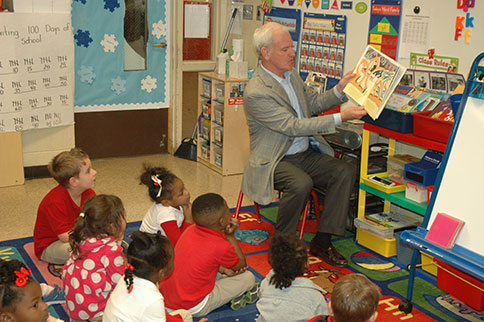
U.S. Congressman Bradley Byrne got an up-close look last week at one of Alabama’s most successful education initiatives. And he liked what he saw.
“I was really impressed with the work going on in their classrooms, but even more impressed by the results,” the congressman posted on his Facebook page after a visit to Rachel Patterson Elementary School. “Pre-K programs make a huge difference in the student’s ultimate achievement level.”
Byrne said during a round table discussion in the school library that included a lengthy dialogue with Donna Breland, who directs the Alabama Department of Early Childhood Education’s Office of School Readiness, that he has been a proponent of public preschool education since he was a member of the state school board in 1995.
“Ed Richardson, who was the state superintendent at that time, said he thought the preschool bill (pending at the time) was so important, he was willing to give up the senior year in high school for it,” Byrne said. “That was a strong statement. But that’s where the whole thing started; he was such a strong proponent of it, he convinced all of us to be strong supporters.”
The former chancellor for the Alabama Community College System pointed out that he was surprised when he became a member of the U.S. House to find that there was solid opposition to the program among the federal lawmakers, an opposition that still prevails.
“There’s a lot of resistance in the legislature, a lot of resistance,” he said. “There are some forces out there who say we shouldn’t be doing this. There are people who think that you’re indoctrinating children. Well, I’ve seen the program, and if that’s indoctrination, we could sure use a lot more of it.”
Alabama’s First Class Pre-K Program has 938 classrooms, including seven in Escambia County, and has been ranked for the past 11 years by the National Institute for Early Education Research as the top state-funded kindergarten program in the nation, for quality.
Rachel Patterson now has two classrooms, as does W.S. Neal Elementary. Flomaton Elementary has one.
Sandra Reid, Elementary Curriculum Supervisor for the county’s public school system, said there is a waiting list that fluctuates “from 11 to 18” children whose parents want to enroll them in the program, while the East Brewton area has several dozen.
Alabama’s pre-K program receives $77.5 million in state appropriations each year, and for the past three years the federal government has kicked in supplemental funds of $17.5 million a year through the federal Preschool Development Grant program. Byrne asked Breland for a brief accounting of those funds.
“When we receive preschool development grant funds, we use that and our state legislative money hand-in-hand,” she answered. “We fund 86 percent of it directly back to the schools. The other 14 percent eventually ends up with the schools, too, because it goes for salaries.”
Allison Muhlendorf, executive director of the Alabama School Readiness Alliance, said the support provided by Byrne, a member of the House Education and Workforce Committee, has been invaluable in making the state’s program so successful.
“Over the last four years, Alabama has been able to increase the pace of First Class Pre-K expansion because of the federal Preschool Development Grant,” she said. “We are grateful for Representative Byrne’s leadership ensuring the PDG grant program continues to be funded so Alabama can continue to allow more students to participate.”
The ASRA is spearheading a 10-year initiative to fully fund the Alabama First Class Pre-K Program by the 2022-23 school year.
After the congressman completed his discussion with the adults, he visited both RPES pre-K classrooms, creating an atmosphere of excitement among the youngsters.
In the class taught by Rachel Hadley and Deloris Johnson, he sat in the floor and joined students as they played with toy dinosaurs and building blocks. He then read a Dr. Seuss book to students in the class taught by Carolyn Turk and Patricia Respess.
After he autographed the book for the student who brought it, Byrne told the children that each of them was destined for great things, if they continued to work hard.
“You were made to move a mountain,” he said as the group of giggling youngsters became quiet. “You’ve just got to figure out which mountain it is that you were made to move, then go work very hard to make sure you find that mountain and move it. If you learn like you’re learning here, I know every one of you will be very, very successful.”
The federal legislator said he would use what he learned and saw during the local visit in the effort to drum up additional support for the preschool program.
“The biggest takeaway from today’s visit is that the rest of the nation has a lot to learn from Alabama’s successful pre-K programs,” he said. “I appreciated the opportunity to visit with the students, teachers, administrators and community leaders who help make the program such a success. I will be sure to take my experience from today back to Washington as we work to improve pre-K programs around the country.”
